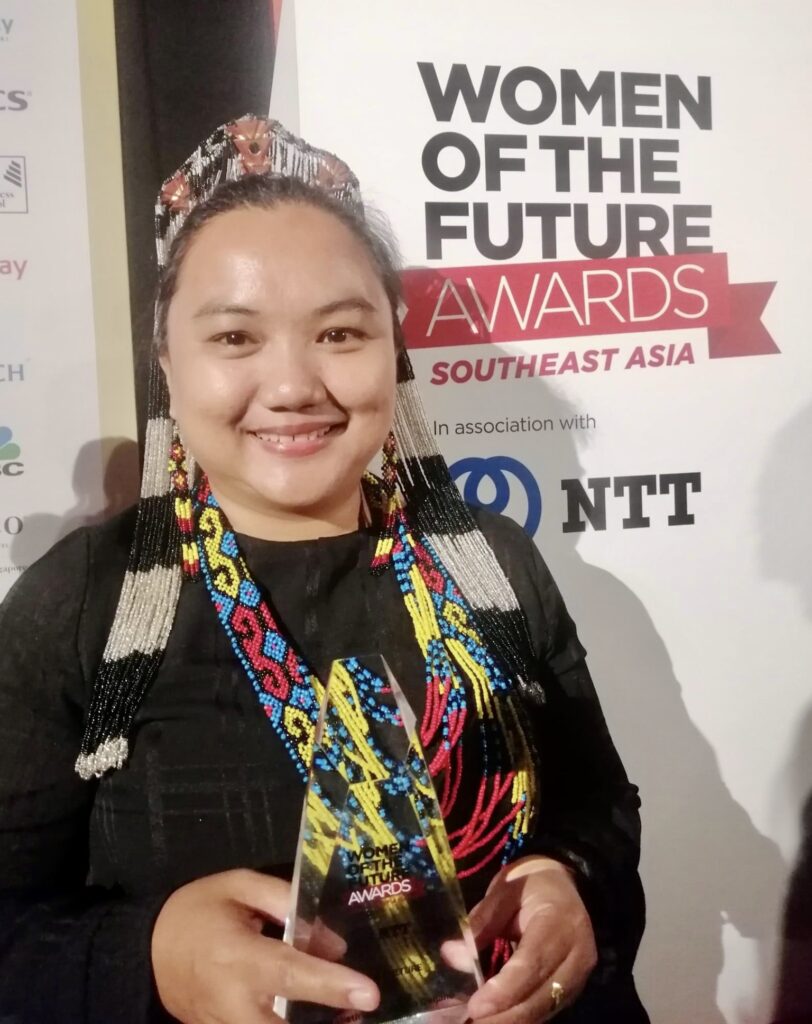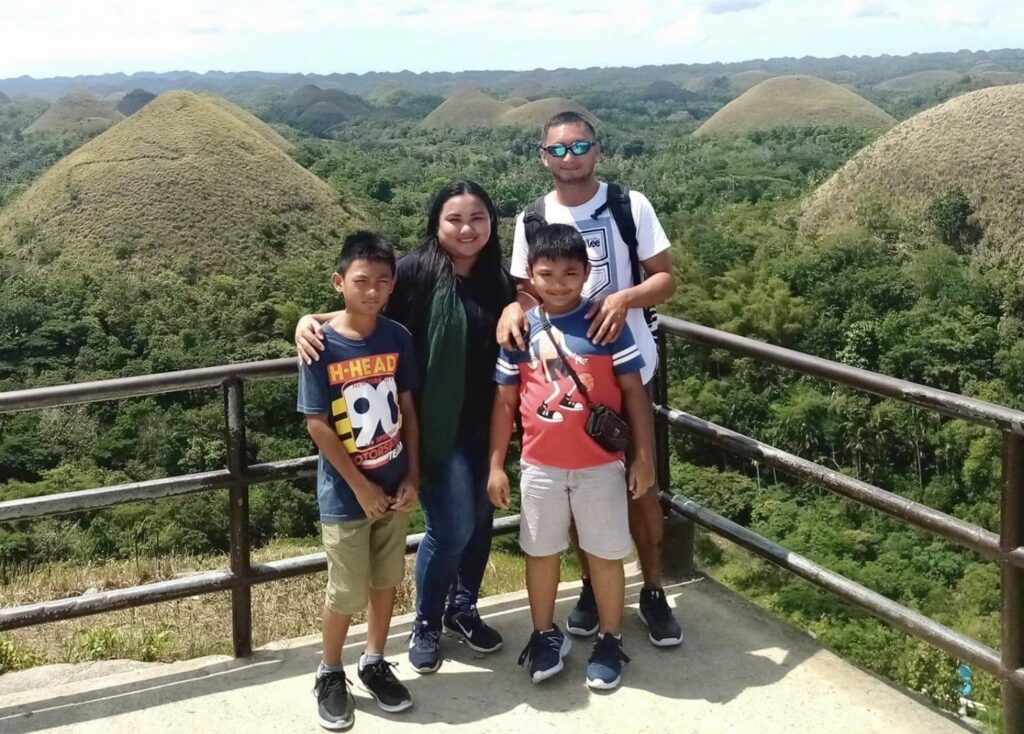Text by Henrylito D. Tacio
Photos courtesy of Elizabeth Joy Quijano
“It means that any Blaan or IP girl can achieve their dream, they can be anybody they want to be. They can be singers, writers, artists. Although not all have the same privileges, that’s why we who have little privileges, we need to step up and help others. We need to use our talents to call for positive change and social development. We need to call for social justice and leaders’ accountability, do whatever you can, even if it’s a small thing (like writing for me) to help others and make their voices and stories get heard.”
Those words came from the mouth of Elizabeth Joy S. Quijano, who was declared winner in the arts and culture category during the Women of the Future Awards (Southeast Asia) held in Singapore.
Quijano bested other nominees like Singapore’s Si En Tan (managing director, film and TV producer, Momo Film Co.), Malaysia’s Lee Ching Ho (creative producer of Theatre for Young People, The Kuala Lumpur Performing Arts Center), Vietnam’s Anh Khong (singer and songwriter, Khong Anh Music), and Malaysia’s Cheyenne Tan (filmmaker, Meralta Films).
It was a triumphant moment when her name was called as the winner. “Elizabeth Joy is committed to capturing and preserving her culture – to ensure her people and their stories are seen and valued,” the citation said. “She is using her art to campaign for social justice and basic rights for marginalized indigenous communities in Mindanao in the Philippines.
“She is not just an artist and writer, but a teacher, mentor and activist seeking to bring about lasting change to government policy that tackles inequality,” the citation added.
In her Facebook account, she recounted when she got the award: “Before, it was just a dream to represent the Philippines. I couldn’t believe it would happen. I cried when my name was called. This was a testimony to how great God is.”
Quijano is a college instructor of the Southern Philippines Agri-business and Marine and Aquatic School of Technology (SPAMAST). She is from Matan-ao, Davao del Sur. She is a B’laan. And she is a writer.
Some of her writings appeared in World Literature Today, Words Without Borders, UP Mindanao Benwa Journal, Shenandoah Literary Magazine, and Ulirat: Best Contemporary Stories in Translation from the Philippines.
Her first book, Dili Pwede Mogawas ug Ubang Sugilanon (which was translated into English by John Bengan), is a collection of short stories and was published by Ateneo de Davao University Press. It is considered the first book written by a Blaan-Ibaloy woman from Davao del Sur.
“The stories are raw, unadorned, and tell of real conflicts and struggles,” wrote Dr. Maracio Tiu, a multi-awarded author, in the book’s foreword. “We are fortunate that Joy has chronicled the dynamics of the socio-economic and political changes that are taking place in her hometown. Who was it who said that if you want to know the history of a place, read its literature? This is a perfect example.”
Quijano (she is married to Jaypee Quijano) started her creative writing at 11 when she wrote her first poem. “I was a voracious reader when I was a kid. I read encyclopedias, dictionaries, National Geographic magazines, and those books donated from the United States,” she recalled.
“There were no cell phones then and I was kind of a nerd type kid so most of the time I read. My mother is a teacher and she bought or on credits a lot of books from people who sell books. She even collected Health and Home Books and magazines even if we’re not Seventh Day Adventists.”
She learned writing just by reading. “I read a lot and thought I could try writing, too,” she said. “I started with personal journals then in high school I wrote feature stories and short stories for our school paper.”
Back then, Quijano really wanted to take creative writing, but the course was not yet available in Davao City, so she took up a Bachelor of Arts in Mass Communication in Holy Cross of Davao College. “I believed it was closer to creative writing,” she said.

When asked who her mentors were in writing, she replied, “I consider all of my teachers as my mentors and I had great teachers. Huge thanks to them.”
But she had favorite writers. As a kid, she followed and researched about Edgar Allan Poe, a famous American author, and novelist. She also read Mary Higgins Clark, Lualhati Bautista, and Bob Ong.
“I like stories that are relatable like Ongs works,” she admitted. “Clark’s characters are also more on women and the storylines are suspenseful. Bautista is of course very passionate on social issues,” she explained.
Quijano also read textbooks and got to read classic stories of Rogelio Sicat, Deogracias Rosario, Amado V Hernandez, and Manuel Arguilla. “Textbooks before were very interesting and available. Now we don’t have quality textbooks in public schools,” she lamented.
When her parents observed that their daughter had a talent in writing, they supported her. “My parents are very supportive, like they didn’t interfere in my choices,” she said. “They let me (do what I wanted to do), but they guided me when I needed them during those difficult adolescent years. I was so blessed my parents provided me with the tools and time I needed to enrich my writing.”
She was 19 when she was impregnated by her husband, who is a driver. “When I got pregnant, I thought my world ended there,” she said, “but God is truly amazing. He makes ways.”
It was a fellow teacher who saw about the Women of the Future Awards, which had an online call for nominations. “I also saw the call on Facebook and followed their page,” she said. “I honestly thought it was just a small award-giving body. But when I visited its website, I was amazed at how they give platforms to women from across the United Kingdom and Southeast Asia.”
When she got word that she was nominated, she was ecstatic. She came to Singapore, not knowing that she would emerge as the winner. “I was crying, and it felt surreal,” she said now. “I can’t believe it. I really didn’t know what to say when it was my turn to give my speech. I just said I dedicate this award to all indigenous women in the Philippines, to all the Blaan. I believe it is now the time for us to write our own stories and for our stories to be heard and read.”
Because she is a woman, a mother, and a wife, Quijano thinks women should write their own stories. “Women need to write their stories,” she said. “The indigenous people need to write about themselves. Representation matters!”
Even before she won the prestigious award, she was already popular. “I’m very glad that a lot of my students, even IP students, are inspired by my work, like it can happen even to an IP,” she said. “Every dream is reachable; you just work hard for it, wait for it and in God’s time, it will come true. Equally important is that you surround yourself with the right people.”


